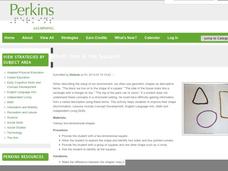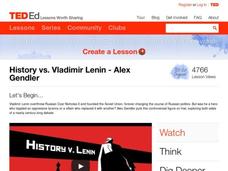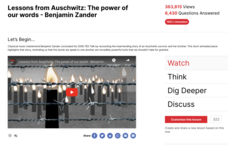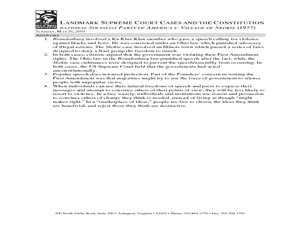Perkins School for the Blind
Following Directions
Turn the act of following directions into a fun and engaging game! Especially designed for students with cognitive or intellectual disabilities, this lesson uses a game format as a natural reinforcer. Write a set of directions onto a set...
Perkins School for the Blind
Mix and Match
Sorting and matching are skills that have all kinds of applications. Learners with low, but useable vision work to match an object to an object, an object to a picture, and a picture to a picture. This will help them identify objects...
Perkins School for the Blind
Treasure Hunt
On, over, and under are some very common prepositions; but how can you teach these concepts to children with visual impairments? Here, is one way. Kids will practice following verbal commands as they go on a classroom treasure hunt. They...
Perkins School for the Blind
3-D Task List
Staying organized is a part of growing up, and it can be as easy as making a list. Here is a set of instructions for making a three-dimensional task list especially for learners with visual impairments or blindness. After making the task...
Perkins School for the Blind
Which One is the Square?
Children who are blind need to constantly be engaged in building conceptual understandings of the world around them. This activity will help them grasp the concept of shape, identify shapes, and consider shapes as they are used to...
Perkins School for the Blind
Where Shall I Put It?
Position and positional phrases are concepts that need to be constructed for learners with low or no vision. Help them gain competence and a conceptual understanding of words like on, in, and under with a funny game. After gathering a...
Perkins School for the Blind
Language Experience Stories
Here is a great way to bring core content to your special education classroom. Included is a set of instructional ideas intended to help learners increase their verbal and written expression through storytelling. Tape recorders, story...
TED-Ed
History vs. Vladimir Lenin
Vladimir Lenin is on trial in an engaging, animated video where the merits and consequences of the formation of the Soviet Union and Lenin's actions are reviewed. This is a great way to illustrate how to establish and argue unique...
TED-Ed
Lessons from Auschwitz: The Power of Our Words
Some words are best left unspoken. Words matter, according to Benjamin Zander, conductor, teacher, and lecturer. To illustrate his point, Zander recounts a story told to him by a survivor of Auschwitz. As a result of her experience...
TED-Ed
Different Ways of Knowing
“Words have colors, emotions, numbers, shapes, and personalities.” Daniel Tammet welcomes viewers to his world with a 10-minutes video that illustrates how he, as an autistic savant, perceives the world. Class members are then...
TED-Ed
What is the World Wide Web?
Did you know that the World Wide Web and the Internet are not the same thing? Did you know that Tim Berners-Lee is considered the father of the Web? Networks, web servers, web hosts, website addresses, domain names, web languages,...
TED-Ed
The Silk Road: Connecting the Ancient World Through Trade
Introduce learners to The Silk Road, the first world-wide web. The narrator of this short, animated video traces the pioneers of globalization and the impact they had on culture and economy. The Scythians, Darius the First, and Alexander...
TED-Ed
How Does Your Brain Respond to Pain?
Zap! Ouch! That hurts! But why? And how come people don't experience or respond to pain in the same way? Take a journey on the sensing pathway, from your nociceptors, along your nerves, up your spinal cord, to neurons and glial, through...
TED-Ed
How Languages Evolve
Do all languages have a common ancestor? Although no one yet knows the answer to that big question, the narrator of this short, animated video explains how linguists use migration patterns, geological features, and word clues to...
TED-Ed
A Brief History of Religion in Art
Did you know that some languages have no word for art? The English language does and the narrator of this short video discusses the aesthetic dimension of religious art as it "visually communicates meaning beyond language."
TED-Ed
Getting Started as a DJ: Mixing, Mashups and Digital Turntables
What do Paris Hilton, Avicii, Diplo, and Cole Plante all have in common? They're DJs! Seventeen-year-old Plante is featured in a short video in which he demonstrates his art and encourages others who might be interested in pursuing a DJ...
Math Solutions
Factor Game
Learning about factors and multiples is all fun and games with this simple math activity. The lesson begins with the teacher and class playing the Factor Game together as young scholars figure out the rules and uncover key...
TED-Ed
Pixar: The Math Behind the Movies
When will we ever use this? A Pixar movie maker explains to students how math is used in the creation of animated films. The movie maker discusses the importance of coordinate planes, transformations and translations, and...
Math Solutions
Shape Sorting: Looking for Green!
Young mathematicians rotate, flip, and sort their way to an understanding of the different attributes of geometric figures. Using transparent yellow and blue shapes, children try to match congruent figures together...
Chicago Botanic Garden
Impacts of Climate Change
Scholars become experts on the eight major impacts of climate change through a jigsaw and grand conversation. They then research and present what they learned about effects specific to their region.
Chicago Botanic Garden
Climate Change Impacts on Ecosystem Services
The fourth activity in a series of five has classes participate in a jigsaw to learn about global impacts of climate change and then share their new information with a home group. Groups then research impacts of climate change (droughts,...
TED-Ed
A Day in the Life of a Mongolian Queen
A four-part lesson features a video that details the life of a Mongolian queen. An eight-question quiz, related resources, and discussion questions follow the video to enhance the learning experience.
Curated OER
Past and Present: Using baseball statistics to teach math
Students use baseball cards to add up batting average and reinforce math skills. In this batting averages lesson plan, students use old baseball cards to practice different math skills and look at other baseball statistics.
Curated OER
Landmark Supreme Court Cases and the Constitution: National Socialist Party of America v. Village of Skokie (1977)
Students examine the impact of court decisions. In this Supreme Court lesson, students read the National Socialist Party of America v. Village of Skokie (1977) case study regarding First Amendment Rights. Students take notes on the case...
Other popular searches
- Class Newsletter
- Bill of Rights Newsletter
- Creating a Newsletter
- Newsletter Template
- Classroom Newsletters
- Autobiographies Newsletter
- Creating Newsletter
- Newsletter Writing
- Writing a Family Newsletter
- Back to School Newsletters
- Newsletter on Computer
- Student Newsletters

























